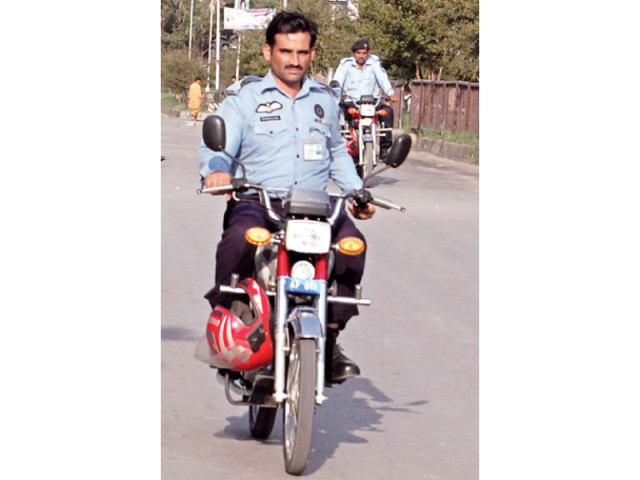Traffic (in)discipline: Habitual violators taking time to mend their ways
Pickets making traffic jams worse.

Helmetless policemen riding in
violation of traffic laws on a day when ITP held a walk to spread awareness about traffic rules. PHOTO: MUHAMMAD JAVAID/EXPRESS
Achieving traffic discipline in the capital city may not sound like such a far-fetched dream if people were to cooperate with the traffic police, but whereas they can be fined for violations, it is the uniformed drivers who pose more of a challenge.
Recently, on the interior ministry’s directions, the Islamabad Traffic Police (ITP) launched an awareness campaign coupled with severe penalties for habitual violators.
But amid efforts to make everybody drive in the right lane, it is Islamabad Police officials who are most likely to violate lane discipline. Apparently, they are among the most reckless drivers and motorcyclists who --- often speeding, and barely ever using seatbelts or helmets.
The traffic police are in a quandary because they do not know how to deal with their colleagues when they are guilty of violations.
“It is tough for us to fine our brothers-in-arms. But this leniency also puts a question mark over our credibility,” a traffic warden told The Express Tribune. But we ought to fine them in case of a violation for the sake of our reputation, he said.
With over 10,000 officials, the majority of the capital police personnel are habitual violators. The black “No Fear” t-shirt-clad elite force officials are no better. They too have no fear of the traffic police.
Despite awareness campaigns in which the police take steps to keep the traffic flowing smoothly in the capital city, bikers and drivers are slow to follow traffic rules.
A traffic police official told The Express Tribune that most police officials prefer to ride motorbikes without carrying documents or even genuine number plates. They don’t wear helmets while driving on main avenues of the city, he said, adding that jumping traffic signals on the pretext of an emergency is also common among police and intelligence officials. It is quite tough for traffic wardens to take disciplinary action in such sensitive situations, stated another traffic police official.
Meanwhile, Islamabad Police officials manning pickets do not bother to ensure traffic discipline or a smooth flow, resulting in gridlocks when there is a red alert.
There are 60 police pickets in and around the capital city. The pickets do not seem to have been set up with any planning. The barricades, especially concrete ones, encroach on half-a-lane of the mostly two-lane roads and are not clearly visible to drivers from a distance at night. A number of traffic accidents occurred due to these unplanned and sometimes unmanned barricades placed by the police.
At present, a police official said that a number of police officials are receiving treatment after vehicles hit the barricades. A police official said quite a few of his colleagues are out of action due to fractured limbs are common as a result of such collisions, with at least one barricade-related death of a policeman occurring last year.
More recently, a Lahore-based government official crashed his double cabin into a pick-up at a picket manned by Aabpara police on Kashmir Highway, causing the vehicle to flip over and catch fire, but there were no serious injuries. The official told the police that he could not see the police picket.
Although the interior minister ordered that check-posts be removed from all exit points, saying they were unnecessary hindrances that disrupt the traffic flow in the city, a number of temporary checkpoints, some at inexplicable locations, remain.
Published in The Express Tribune, September 1st, 2013.



















COMMENTS
Comments are moderated and generally will be posted if they are on-topic and not abusive.
For more information, please see our Comments FAQ